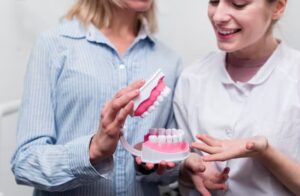Replacing lost teeth is not just about filling a gap in your smile. Missing teeth can affect how you bite, speak, and even how you view yourself. Modern dental implants offer a way to restore function and appearance without relying on removable dentures or traditional bridges. This article examines how these permanent replacements work and why many people choose them for long‑term oral health.
Understanding Dental Implants
Dental implants are artificial roots made from biocompatible materials, usually titanium or zirconia. They are surgically inserted into the jawbone in place of the natural tooth root and hold an artificial tooth, like a crown or bridge. According to the U.S. Food and Drug Administration (FDA), a dental implant system consists of the implant body, which is anchored into the jawbone, an abutment that extends through the gum, and a fixation screw. Once healed, the implant supports a crown, bridge, or denture so the patient can chew and smile normally.
Benefits of Choosing Dental Implants for Missing Teeth
Dental implants offer more than a cosmetic fix; they provide functional advantages, preserve oral structures, and often enhance a person’s confidence. The sections below outline these benefits in detail.
Functional Advantages
Restoring Chewing Power
One of the most immediate impacts of tooth loss is a reduced ability to chew. The FDA lists restoring the ability to chew as a primary benefit of implant systems. Removable dentures can slip, limiting what patients can eat. Many professional dentists observe that implants act like natural roots anchored into bone, allowing patients to bite and chew with strength and confidence. The stability of an implant prevents shifting or clicking during meals, enabling people to enjoy a varied diet again.
Better chewing has knock‑on effects for health. Effective mastication breaks food down properly, improving digestion and nutrient absorption. Patients often report being able to eat crunchy vegetables and chewy proteins without pain, which supports balanced nutrition.
Improving Speech and Enunciation
Teeth play a critical role in forming sounds. Missing teeth or ill‑fitting dentures can cause slurred or unclear speech and may require the speaker to adjust tongue placement. Implants restore natural spacing because they are fixed in the bone; they do not shift during speech. Dentists explain that this stability helps restore clarity, particularly for sounds that require contact between teeth and tongue, such as “s,” “f,” and “th”. The improved speech clarity reduces frustration and helps patients communicate confidently.
Stabilizing Dentures
For people who wear removable dentures, implants can act as anchors. Our dentist notes that implants provide stability for wobbly dentures. Implant‑supported dentures snap onto the posts, eliminating the need for adhesives and reducing the risk of slippage when speaking or eating.
Bone and Oral Health Benefits
Preventing Bone Loss and Maintaining Facial Structure
When a natural tooth root is lost, the surrounding jawbone begins to shrink because it no longer receives the pressure stimulus from chewing. This can lead to a sunken facial appearance and changes in bite. Our dental professionals point out that implants integrate with the jawbone through osseointegration and stimulate the bone, preventing deterioration and maintaining a natural facial profile. The FDA also states that implants help keep the jawbone from shrinking and preserve the health of the surrounding bone and gums.
Preserving Adjacent Teeth
Bridges require grinding down neighbouring teeth for support, which may weaken them over time. A single dental implant replaces one tooth without affecting adjacent teeth. Our dental clinic underscores this benefit: implants provide a one‑tooth solution without removing enamel from adjacent teeth. Preserving natural tooth structure helps prevent secondary issues such as tooth sensitivity or further decay.
Maintaining Gum Health
Because implants integrate with bone and do not rely on gums for support, they reduce pressure on gum tissue compared with dentures. The FDA notes that implants preserve the health of the surrounding gums. Regular brushing, flossing, and dental checkups are still necessary, but implants can make oral hygiene easier than caring for removable prostheses.
Comfort and Convenience
Feeling Like Natural Teeth
Implants are designed to look, feel, and function like natural teeth. They do not need to be removed for cleaning or at night, unlike dentures. Our dentists highlights that implants are discreet and do not require taking them out at bedtime. Because the crown or bridge is custom-made to match the colour and shape of surrounding teeth, it blends seamlessly into the smile.
Eliminating Denture Hassles
Removable dentures often cause sore spots, require adhesives, and may need refitting as the jawbone shrinks. Implant‑supported teeth eliminate these inconveniences. Patients can eat, talk, and laugh without worrying about dentures slipping or clicking.
Aesthetic and Psychological Benefits
Enhanced Smile and Self‑Confidence
A complete smile has a profound effect on self‑image. Our dental clinic lists an enhanced smile as one of the key benefits of dental implants. With implants, custom crowns are crafted to match natural teeth, giving a lifelike appearance. Restoring a full set of teeth often reduces self‑consciousness when speaking or laughing.
Improved Quality of Life
Research supports the idea that implants enhance overall well‑being. A 2025 before–and–after study in the journal Healthcare found a significant improvement in oral‑health‑related quality of life after implant‑prosthetic rehabilitation. The study reported a decrease in OHIP‑14 scores (from 29.64 to 22.18), indicating reduced discomfort and better function. It also noted improvements in speech pronunciation, taste perception, comfort, and a reduction in feelings of insecurity. This aligns with the FDA’s view that implants can improve quality of life and health.
Supporting Mental Well‑Being
Beyond functional improvements, restoring a complete set of teeth can reduce anxiety linked to eating or socializing. When patients no longer worry about dentures slipping or mispronouncing words, they can engage more freely in social activities. Studies have found that implant therapy reduces psychological discomfort and social disability, contributing to better mental well‑being.
Long‑Term Investment
Durability and Longevity
Dental implants are designed to last. Our dentists note that implants can last a lifetime with proper care, surpassing the five‑ to ten‑year lifespan of most bridges and dentures. Our dental clinic echoes this, stating that implants offer longevity and can last indefinitely with brushing, flossing, and regular dental visits. While the prosthetic crown or bridge may need replacement after several years, the implant post often remains stable for decades.
Cost Considerations and Value
Implants involve a higher upfront cost than dentures or bridges. Our dental clinic estimates that implants can cost between $2,000 and $4,000 per tooth, but they may be partly covered by dental insurance. Because implants are long‑lasting, they may offer better value over time, avoiding the need for repeated replacement of dentures or bridges.
Why Choose Dental Implants for Missing Teeth
Dental implants have changed the way dentists replace missing teeth. They mimic natural teeth by fusing with the jawbone, restoring chewing power and speech clarity, and preventing bone loss. Implants protect adjacent teeth, support gum health, and often last decades with proper care. Beyond physical benefits, research shows that implants improve quality of life, self‑confidence, and social well‑being. While the initial cost is higher and certain risks exist, many patients find that the comfort, appearance, and long‑term value of implants make them an excellent choice for tooth replacement.





